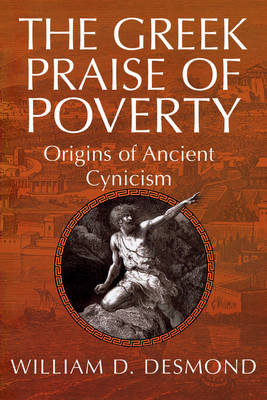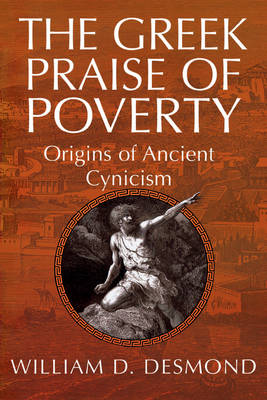
Bedankt voor het vertrouwen het afgelopen jaar! Om jou te bedanken bieden we GRATIS verzending (in België) aan op alles gedurende de hele maand januari.
- Afhalen na 1 uur in een winkel met voorraad
- In januari gratis thuislevering in België
- Ruim aanbod met 7 miljoen producten
Bedankt voor het vertrouwen het afgelopen jaar! Om jou te bedanken bieden we GRATIS verzending (in België) aan op alles gedurende de hele maand januari.
- Afhalen na 1 uur in een winkel met voorraad
- In januari gratis thuislevering in België
- Ruim aanbod met 7 miljoen producten
Zoeken
€ 49,45
+ 98 punten
Uitvoering
Omschrijving
William Desmond, taking issue with typical assessments of the ancient Cynics, contends that figures such as Antisthenes and Diogenes were not cultural outcasts or marginal voices in the classical culture of the fifth and fourth centuries B.C. Rather, the Cynic movement had deep and significant roots in what Desmond calls "the Greek praise of poverty." Desmond demonstrates that classical attitudes toward wealth were complex and ambivalent, and allowed for an implicit praise of poverty and the virtues it could inspire. From an economic and political point of view, the poor majority at Athens and elsewhere were natural democrats who distrusted great concentrations of wealth as potentially oligarchical or tyrannical. Hence, the poor could be praised in contemporary literature for their industry, honesty, frugality, and temperance. The rich, on the other hand, were often criticized as idle, unjust, arrogant, and profligate. These perspectives were reinforced by typical Greek experiences of war, and the belief that poverty fostered the virtues of courage and endurance. Finally, from an early date, Greek philosophers associated wisdom with the transcendence of sense experience and of such worldly values as wealth and honor. The Cynics, Desmond asserts, assimilated all of these ideas in creating their distinctive and radical brand of asceticism. Theirs was a startling and paradoxical outlook, but it had broad appeal and would persist to exert a manifold influence in the Hellenistic period and beyond.
Specificaties
Betrokkenen
- Auteur(s):
- Uitgeverij:
Inhoud
- Aantal bladzijden:
- 256
- Taal:
- Engels
Eigenschappen
- Productcode (EAN):
- 9780268025823
- Verschijningsdatum:
- 30/01/2006
- Uitvoering:
- Paperback
- Formaat:
- Trade paperback (VS)
- Afmetingen:
- 161 mm x 230 mm
- Gewicht:
- 385 g

Alleen bij Standaard Boekhandel
+ 98 punten op je klantenkaart van Standaard Boekhandel
Beoordelingen
We publiceren alleen reviews die voldoen aan de voorwaarden voor reviews. Bekijk onze voorwaarden voor reviews.









